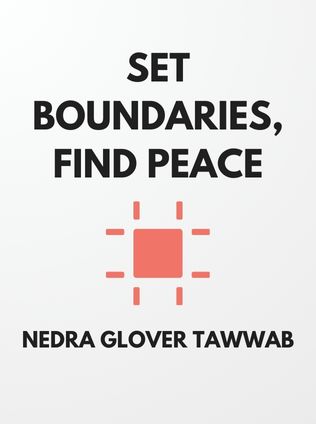
Set Boundaries, Find Peace
A Guide to Reclaiming Yourself
By Nedra Glover Tawwab
Published 01/2021
About the Author
Nedra Glover Tawwab is a distinguished clinical therapist, social worker, and an advocate for mental health. She has spent years guiding individuals toward healthier lives through her practical approach to therapy and boundary-setting. Tawwab’s influence extends beyond her clinical practice into the digital world, where she shares insights on mental health, self-care, and relationships with a vast audience on Instagram. Her ability to distill complex psychological concepts into accessible advice has made her a trusted voice in the realm of personal development. In 2021, Tawwab published "Set Boundaries, Find Peace," a book that has quickly become an essential guide for those seeking to improve their relationships and enhance their emotional well-being.
Main Idea
"Set Boundaries, Find Peace" is centered on the critical concept of boundaries—what they are, why they are essential, and how to establish them effectively in various facets of life. Tawwab argues that boundaries are fundamental to maintaining healthy relationships and protecting one’s mental and emotional health. The book provides practical strategies for identifying, setting, and reinforcing boundaries in relationships with family, friends, colleagues, and even oneself. By setting clear boundaries, individuals can avoid burnout, reduce anxiety, and foster more meaningful and respectful connections with others.
Tawwab’s core message is clear: boundaries are not just defensive measures; they are proactive steps toward creating the life you want. She writes, "Boundaries are the distance at which I can love you and me simultaneously." This powerful quote encapsulates the essence of her philosophy, emphasizing that boundaries are about finding balance in relationships—not about shutting people out but about creating space for both parties to thrive.
Table of Contents
- Introduction: Understanding Boundaries
- Healthy Boundaries and Unhealthy Boundaries
- How to Set Boundaries
- Common Problem Areas for Boundary-Setting
- Boundary Violations and How to Respond
- Conclusion: The Path to Peace
Introduction: Understanding Boundaries
Tawwab begins her exploration of boundaries by offering a clear definition: boundaries are personal limits that dictate how others can interact with us. These limits are shaped by our upbringing, cultural background, and personal experiences. Healthy boundaries are crucial because they protect our mental and emotional well-being, ensuring that we are treated with respect and dignity in all our relationships. Without boundaries, we risk becoming overwhelmed, resentful, and exhausted as we continuously accommodate the needs of others at the expense of our own.
In the context of relationships, Tawwab argues that boundaries are a form of self-respect. They allow us to preserve our energy, focus on what truly matters, and maintain our integrity. "Setting boundaries is not about being mean," she explains, "It’s about being clear." This clarity is essential for fostering relationships that are not only respectful but also deeply fulfilling.
Boundaries
- Personal boundaries, such as deciding the level of physical touch one is comfortable with in various relationships.
- Social boundaries, including how much time one is willing to dedicate to social activities and with whom.
- Professional boundaries, like defining work hours, the scope of responsibilities, and expectations for communication.
- Emotional boundaries, which protect one's feelings and mental health by determining what kind of emotional labor one is willing to engage in.
Healthy Boundaries and Unhealthy Boundaries
Tawwab distinguishes between healthy and unhealthy boundaries, offering a nuanced perspective on how these boundaries can manifest in our lives. Healthy boundaries strike a balance between accommodating others and protecting oneself. They are flexible, allowing for close and comfortable relationships where both parties feel respected. In contrast, unhealthy boundaries can either be too porous, where one’s needs are continuously sidelined, or too rigid, where emotional walls are built too high, preventing meaningful connections.
Sign up for FREE and get access to 1,400+ books summaries.
You May Also Like
The Subtle Art of Not Giving a F*ck
A Counterintuitive Approach to Living a Good Life
By Mark MansonRich Dad Poor Dad
What the Rich Teach Their Kids About Money - That the Poor and Middle Class Do Not!
By Robert T. KiyosakiHow To Win Friends and Influence People
The All-Time Classic Manual Of People Skills
By Dale CarnegieFreakonomics
A Rogue Economist Explores the Hidden Side of Everything
By Steven D. Levitt and Stephen J. Dubner



















